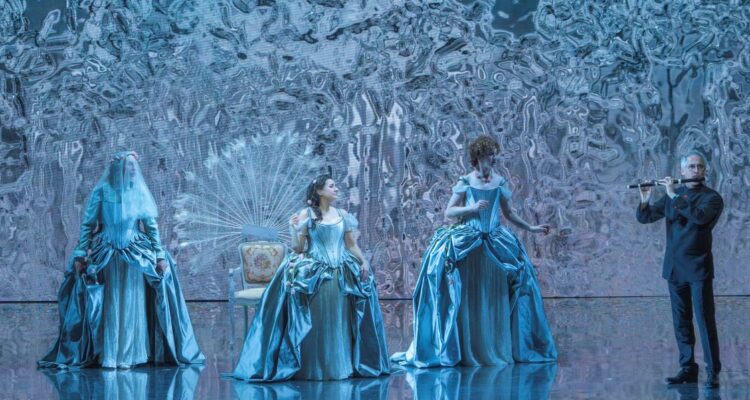The title refers to the relationship between composer Nicola Porpora (1686-1788) and his pupil, Carlo Broschi, the first operatic castrato superstar, Farinelli (1705-1782). In 1734, Farinelli joined Porpora’s troupe in London singing Hasse’s Artaserse caused a sensation. In 1737 he went to Spain to sing solely for Philip V and was never heard in public again.
This is the final event in Cecilia Bartoli’s highly successful 2023-4 season as Opera Director. The show is the brainchild of Bartoli/Malkovich who commissioned playwright/director Michael Sturminger to write it. The dialogue is in English with surtitles.
The curtain opens to the first stage rehearsal of a new opera project.
We are thrown into the baroque world with Vivaldi’s 5th Overture.
Retired (fictional) famous American countertenor, Jeffrey Himmelhoch (Malkovich) with long hippy hair and red shades, explains. In a Madrid bookshop, he found a written manuscript by his lifelong idol, Farinelli. This is Jeff’s homage to Farinelli. Jeff constantly complains to the young director, Rosie, moaning that he ‘should go back to Fort Lauderdale, the beaches are just as nice’. His grand entrance to descend from centre-stage is thwarted – ‘As the Julius Caesar sets have taken all the fly space’. He wheels himself ignominiously in on a golden chariot instead. Himmelhoch (high-in-the-sky) bewails gender bending and cancel culture. How crazy it was when women were banned from theatres and singing music.
Himmelhoch’s show is a ‘pasticcio’ – a patchwork of beautiful arias from Baroque history (common in Farinelli’s time). He needs a counter-tenor and a mezzo-soprano with a range high and low enough to equal Farinelli’s. A young counter-tenor, Lukas Dahlberg (Mathmann) incarnates ‘Farinelli’, but no mezzo can be found. The cleaning lady, Maddalena Cigno (Bartoli) magically appears to save the day.
When Superstar Bartoli sings, she stops time. Vivaldi’s ‘Gelido in ogni vena’. No superlative is good enough for how she sings this, the best number in the show. It is stunning.
Seemingly, Porpora was a brute, making Farinelli’s life a misery, beating him, despite singing with the voice His Master wants him to have. Mathmann sings Pergolesi’s ‘Confessio’ like an angel. It is amusing when Bartoli, as Porpora gives Farinelli a singing lesson – what an invaluable insight into her technique!
The Gender Duel shows how a castrato’s voice can be separately represented by a counter-tenor and a mezzo. Steffani’s ‘Amami’ and Pergolesi’s ‘quando corpus’ were both sung as duets, each singer alternating the A/B sections with individual variations. Mathmann’s boyish sound contrasts with Bartoli’s richness. His English is almost perfect.
We are treated to a string of breathtaking arias by Bartoli.
Another highlight is Handel’s ‘sol da te’ from Orlando Furioso, where Bartoli intertwines with a solo flute (Jean-Marc Goujon).
Bartoli then sings Handel’s ‘Ah me! Too late I now repent’ from Semele. Her English is perfect!
Bartoli, in very high heels, sings her last aria -Handel’s ‘Lascia la spina’ in front of a single large red rose. It shows beauty of tone, elegant phrasing, superlative breath control. Stunning.
The evening ends with Monteverdi’s ‘Pur ti miro’ – the first duet in the history of opera. It is sung by Bartoli and Malkovich who has such a terrible voice it is embarrassing. Bartoli/Mathmann should sing this and the ending would be sublime instead of a let-down.
Despite equal billing, this is a Bartoli masterclass. Malkovich struggles to remember his lines. We know because the translation of what he should have said is on supertitles. Most of his jokes fall flat because he mumbles.
The story ends roughly at the part of Farinelli’s life where Claire van Kampen’s wonderful play, ‘Farinelli and the King’ begins. For those who lucky enough to see the play, this is a fascinating prequel.
The show needs tightening; there are some awkward silences. The staging is problematic. Unless seated centrally, you miss everything on the sides. As this is the first performance, things can be adjusted. With a tighter show, better audience sight lines, and Mathmann substituting Malkovich in ‘pur ti miro’ this should be a 5* performance.
It is part of Bartoli’s ‘Barocchissimo’ festival, which will be repeated in Versailles on 8th June and Vienna on 10th July.
Although there is no evidence Farinelli wrote a diary, his contemporary Charles Burney wrote much about him. Farinelli, self-effacingly said – ‘the little that I have done is already gone and forgotten’. How wrong he was!
Salle Garnier Opera de Monte-Carlo
Operatic Spectacle by Michael Sturminger
Music by: Antonio Vivaldi, Jean-Baptiste Pergolesi, Georg Friedrich Haendel, Agostino Steffani, Nicola Porpora, Claudio Monteverdi
Created in co-production with le Printemps des Arts de Monaco
Libretto Jules Henry Vernoy de Saint-Georges and Jean-François Bayard
Conducted by Gianluca Capuano
Directed by Michael Sturminger
Photo Credit Marco Borelli
Cast includes Cecilia Bartoli, John Malkovich, Emily Cox, Philipp Mathmann.
Running time 1 hour 40 minutes without interval
7th April 2024

